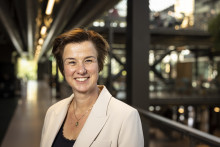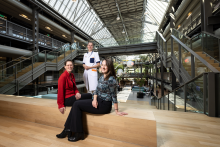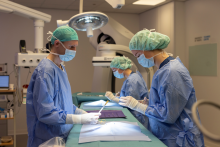For Maroeska Rovers it is apparent that society faces a major challenge in maintaining good healthcare for all. Currently, about one sixth of the labour force works in healthcare. Due to a rising demand for healthcare, an ageing population and a shortage on the labour market, that fraction will grow to about one-third within the next thirty years. In short, we are facing an unsustainable situation. 'We need to think about what we can and cannot do in the future. That calls for keen choices, with support from citizens and healthcare workers alike.'
Innovation
Prevention, digital healthcare and technological tools are the key ingredients for a future-proof healthcare system, as stated by the new scientific director of the TechMed Centre. As a technical university, the UT can aid in the development of these new technologies. 'But it is very important that we do not just drop off developed technology in the hospital or elsewhere in the healthcare chain. At the moment, innovation often adds something, without taking anything away in return.'
Use of tools
Instead of decreasing workload, technology sometimes results in more tasks for healthcare staff. 'When we deploy new technological tools, it would be sensible to stop doing something else. We need to think about it at the front end during technology development. How and where do we want to deploy these tools, and who will use them? That's where I see great opportunities for the TechMed Centre.'
'With the knowledge of process optimisation within the UT, we can successfully deploy innovations within the healthcare chain'
Process optimisation
Rovers mentions TOPFIT Citizenlab, the research and innovation programme on campus, as a prime example. 'It is a testing ground where citizens and healthcare staff develop and test innovations together.' She also mentions the ongoing research in the field of process optimisation, for example at the department of UT professor Erwin Hans. 'When we want to apply new tools, we need to think about the entire healthcare process within which this tool plays a role. With the knowledge of process optimisation within the UT, we can successfully deploy innovations within the healthcare chain.'

The region
There is even another important role for the TechMed Centre, according to Rovers. 'We can bring different parties together here. Not just within the university. We want to bring companies, educational institutions, health insurers, citizens and healthcare partners from the region together. As scientific director, I also see that as my task. I know the healthcare domain well and my expertise is in the field of implementation of innovations. I want to combine this knowledge and experience to think about solutions together with our partners.'
'If an innovation was not developed at the hospital in question, they prefer not to apply it'
According to Rovers, cooperation is a great strength of the Eastern Netherlands. 'Many hospitals suffer from the 'not invented here' syndrome. If an innovation was not developed at the hospital in question, they prefer not to apply it. But in our region, the parties involved are willing to share. The collaborative environment in the Eastern Netherlands allows us to mould this region into a test lab for new innovations.'
Hinterland
The scientific director has high hopes that this cooperation will not be limited to the Netherlands. 'Staff shortages, for example due to an ageing population, are not merely a Dutch problem. All of Europe is facing it. As a region, we can make use of our unique position with Germany as our hinterland. For foreign companies, the Netherlands is of interest because of good opportunities to test products, as our clinical studies are among the best in the world. However, the Netherlands has a small market; many foreign companies come and ask if we can help them introduce their products in Germany as well. By cooperating better with our neighbours across the border, we can strengthen the region even further.'
CV Maroeska Rovers
Rovers studied biomedical sciences and obtained her PhD from the Radboud University Nijmegen for her research on the effectiveness of eardrum tubes in young children. After her PhD, she worked as a postdoc at the MRC Institute of Hearing Research in Nottingham. Rovers became an associate professor, and then a senior lecturer at the Julius Centre of the UMC Utrecht in 2001. In 2012, she was appointed professor of evidence-based surgery at the Radboud University Medical Centre. Currently, Rovers is one of the two (founding) directors of Health Innovation Netherlands and scientific director of the Medical Innovation & Technology Expertise Centre (MITec). Since September 2022, Rovers has also been scientific director of the TechMed Centre.







